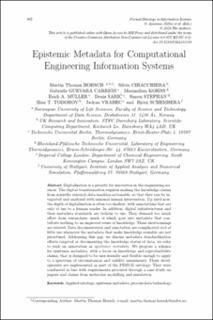| dc.contributor.author | Horsch, Martin Thomas | |
| dc.contributor.author | Chiacchiera, Silvia | |
| dc.contributor.author | Guevara Carrión, Gabriela | |
| dc.contributor.author | Kohns, Maximilian | |
| dc.contributor.author | Müller, Erich A. | |
| dc.contributor.author | Šarić, Denis | |
| dc.contributor.author | Stephan, Simon | |
| dc.contributor.author | Todorov, Ilian T. | |
| dc.contributor.author | Vrabec, Jadran | |
| dc.contributor.author | Schembera, Björn | |
| dc.date.accessioned | 2024-01-02T07:58:09Z | |
| dc.date.available | 2024-01-02T07:58:09Z | |
| dc.date.created | 2023-12-24T10:30:30Z | |
| dc.date.issued | 2023 | |
| dc.identifier.citation | Formal Ontology in Information Systems. 2022. 377 | en_US |
| dc.identifier.isbn | 9781643684680 | |
| dc.identifier.uri | https://hdl.handle.net/11250/3109218 | |
| dc.description.abstract | Digitalization is a priority for innovation in the engineering sciences. The digital transformation requires making the knowledge claims from scientific research data machine-actionable, so that they can be integrated and analysed with minimal human intervention. Up until now, the depth of digitalization is often too shallow, with annotations that are only of use to a human reader. In addition, digital infrastructures and their metadata standards are tedious to use: They demand too much effort from researchers, much of which goes into metadata that contribute nothing to an improved reuse of knowledge. These shortcomings are related. Data documentation and annotation are complicated and of little use whenever the metadata that make knowledge reusable are not prioritized. Addressing this gap, we discuss metadata standardization efforts targeted at documenting the knowledge status of data; we refer to such an annotation as epistemic metadata. We propose a schema for epistemic metadata, with a focus on knowledge and reproducibility claims, that is designed to be user-friendly and flexible enough to apply to a spectrum of circumstances and validity assessments. These developments are implemented as part of the PIMS-II ontology. They were conducted in line with requirements procured through a case study on papers and claims from molecular modelling and simulation. | en_US |
| dc.description.abstract | Epistemic metadata for computational engineering information systems | en_US |
| dc.language.iso | eng | en_US |
| dc.publisher | IOS Press | en_US |
| dc.relation.ispartof | Formal Ontology in Information Systems: Proceedings of the 13th International Conference (FOIS 2023) | |
| dc.title | Epistemic metadata for computational engineering information systems | en_US |
| dc.title.alternative | Epistemic metadata for computational engineering information systems | en_US |
| dc.type | Chapter | en_US |
| dc.description.version | publishedVersion | en_US |
| dc.subject.nsi | VDP::Kjemisk prosessteknologi: 562 | en_US |
| dc.subject.nsi | VDP::Chemical process engineering: 562 | en_US |
| dc.subject.nsi | VDP::Kjemisk prosessteknologi: 562 | en_US |
| dc.subject.nsi | VDP::Chemical process engineering: 562 | en_US |
| dc.source.pagenumber | 302-317 | en_US |
| dc.identifier.doi | 10.3233/FAIA231136 | |
| dc.identifier.cristin | 2217474 | |
| dc.relation.project | EC/H2020/DOME 4.0 (H2020 GA no. 953163) | en_US |
| dc.relation.project | EC/H2020/953163 | en_US |
| dc.relation.project | EC/H2020/OntoCommons (H2020 GA no. 958371) | en_US |
| dc.relation.project | Deutsche Forschungsgemeinschaft: NFDI MaRDI (460135501) | en_US |
| cristin.ispublished | true | |
| cristin.fulltext | original | |
| cristin.fulltext | postprint | |
| cristin.qualitycode | 1 | |
